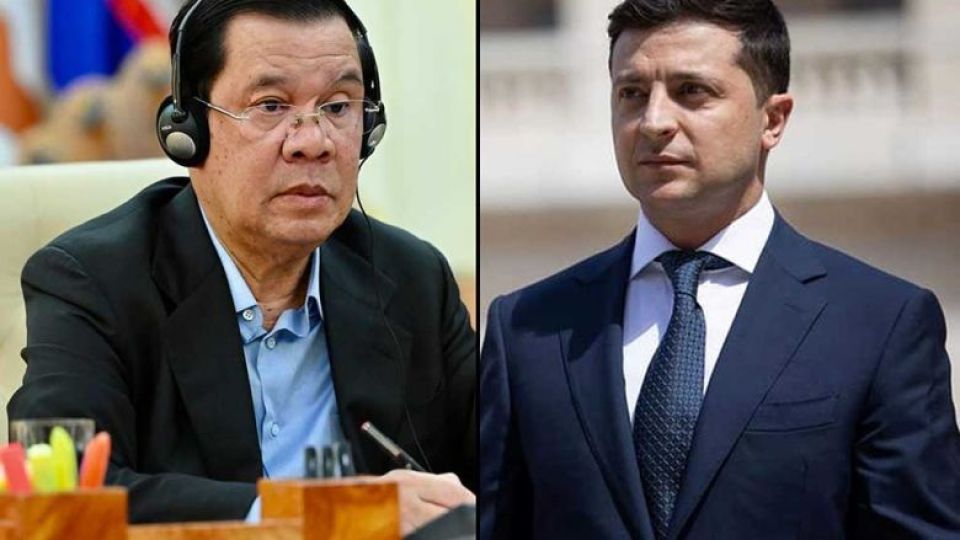November 3, 2022
PHNOM PENH – Cambodia and Ukraine have agreed to appoint their respective ambassadors to boost diplomatic relations, while Prime Minister Hun Sen has accepted his counterpart’s invitation to visit the country at a “suitable time”.
The agreement came during a telephone conversation between Hun Sen and Ukrainian President Volodymyr Zelensky on November 1, according to a press statement released by the Ministry of Foreign Affairs and International Cooperation.
“At the end of the dialogue, [Hun Sen] accepted the invitation to pay a visit to Ukraine at a suitable time,” it said, noting that Hun Sen had visited Ukraine once in 1981 when it was still a part of the Soviet Union.
Zelensky expressed his appreciation and gratitude for the Kingdom’s support and co-sponsorship of the UN General Assembly (UNGA) resolutions against Russia’s invasion of Ukraine and annexations of its territory.
Hun Sen reiterated during the phone call that Cambodia adheres to the UN Charter and international laws and is therefore against aggression, threat or use of force that violates the sovereignty and the territorial integrity of independent states, nor does the Kingdom support secession or the annexation of one country’s territory by another under any circumstances.
Hun Sen conveyed his sympathy for the tragedies taking place in Ukraine and expressed his concern over Russia’s recent attacks on its capital Kiev and other regions, which caused heavy casualties, severe damage civilian infrastructure, power outages and water shortages. He said the ongoing was has worsen the energy and food crises and rising inflation around the globe.
Having shared the lessons learned by Cambodia’s suffering through a very long period of armed conflict, Hun Sen also stressed that “war cannot be ended by war”.
“[Hun Sen] reiterated the importance of peaceful negotiations and resolutions and hoped that all parties concerned will strive for a comprehensive solution to end the war in Ukraine so that it can regain peace, stability, territorial integrity and development,” the statement said.
In his capacity as ASEAN chair, Hun Sen also discussed ASEAN-Ukraine relations with Zelensky.
The embattled Ukrainian leader expressed “heartfelt gratitude” for the three ASEAN statements issued so far in support of Ukraine and also thanked Cambodia for its support of Ukraine’s request for accession to the Treaty of Amity and Cooperation in Southeast Asia (TAC).
Zelensky also requested the opportunity to deliver a statement via video link during the upcoming ASEAN Summit and reaffirmed Ukraine’s wish to become the bloc’s Sectoral Dialogue Partner, an upgrade in relations which Hun Sen supported.
The premier said he would continue to help work towards realising that goal with the other ASEAN member states.
In his nightly address to the nation prior to the phone call, Zelensky said he had also discussed food security and grain exports to Cambodia.
“I talked about this with the prime minister of Cambodia today. This country now holds the presidency of ASEAN, one of the most powerful world associations. That’s more than 600 million people in 10 countries,” he said, noting that the food crisis is a real threat to national security for countries in the Southeast Asian region.
“If food prices rise due to the Russian aggression, if there is a deficit in the food market, this will inevitably lead to catastrophic consequences in most ASEAN countries, as well as in other regions of the world. Therefore, pressure on Russia for the sake of guarantees of food security is now needed from everyone – and from Asian countries as well,” he said.
Thong Mengdavid, a research fellow at the Asian Vision Institute’s Mekong Centre for Strategic Studies, likened Ukraine’s current situation to that of Cambodia during the 1980s, when it suffered due to outside pressure from powerful countries.
He said Cambodia back then and today does not want to see smaller countries being embargoed by more powerful ones or being used as a battlefield by any regional power or superpower.
Mengdavid views the forging of bilateral relations between Cambodia and Ukraine as a positive move.
“Building diplomatic relations between the two countries will facilitate trade and improved political relationships. I think Cambodia will support Ukraine in its pursuit of a peaceful solution based on international laws,” he said.
Kin Phea, director of the International Relations Institute at the Royal Academy of Cambodia, said the phone conversation between the two leaders clearly demonstrated the Kingdom’s unambiguous position in support of Ukraine amid the conflict.
“Cambodia has consistently expressed that it is against the use of force by one country against another and that it supports peaceful negotiations base on the principle that ‘war cannot be ended by war’”, he said.
Regarding Ukraine’s request for accession to the TAC, Phea said it requires discussion among the ASEAN member states and TAC members first, but the treaty itself stands for peace, non-interference in others’ internal affairs, and respect for sovereignty, independence, integrity, and peaceful coexistence for the sake of regional and global peace and security.
Phea was of the view that the phone conversation between Hun Sen and Zelensky would likely improve Cambodia and Ukraine’s relations, though it comes at the risk of angering Russia.


